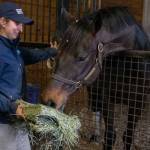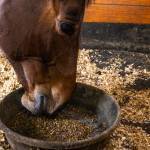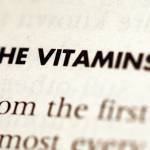Choosing Forages for Horses

The basic senses of sight, smell, and touch can help differentiate high- and poor-quality forages for your horses, even among novice caretakers, according to a recent study.
This conclusion was reached by a group of French researchers* that invited 54 untrained individuals to identify the quality of hay samples based on sight, smell, and touch. Those samples were later analyzed for digestible energy (DE), acid detergent fiber (ADF), crude fat, crude protein (CP), nonfiber carbohydrate (NDC), and other parameters.
After reviewing the results of the study, the researchers wrote that “although participants were not considered experts on hay selection, our work underscored they could well discriminate DE value and ADF content of hays based on sight, smell, and touch perception. To a lesser extent, NDC and CP content were distinguished through odor and appearance modalities, respectively.”
Although these results may suggest that essentially anyone can choose quality forage for horses, this is not the take-home message.
“Forage forms the basis of equine diets. A quality product must be selected to avoid health problems due to lack of energy, minerals, and vitamins. While sensory cues may help the forage-selection process, I do not recommend relying solely on these,” emphasized Kathleen Crandell, Ph.D., a Kentucky Equine Research nutritionist.
Complete hay analysis provides owners with detailed information regarding the energy content, soluble carbohydrate level, and mineral balance.
“Hay analysis paints a clear picture of what hay actually contains and whether ration balancers, hay soaking, or other forage modifications would benefit your horse,” advised Crandell.
She added, “This holds particularly true for high-performance horses, those with medical issues such as insulin dysregulation or equine metabolic syndrome, and older horses or hard keepers that struggle to maintain condition.”
For additional information on hay analysis, choosing appropriate forages, and any other nutritional concerns, contact a Kentucky Equine Research nutrition advisor today!
*Julliand, S., C. Dacremont, C. Omphalius, et al. Association between nutritional values of hays fed to horses and sensory properties as perceived by human sight, touch and smell. Animal 13:1834-1842.








